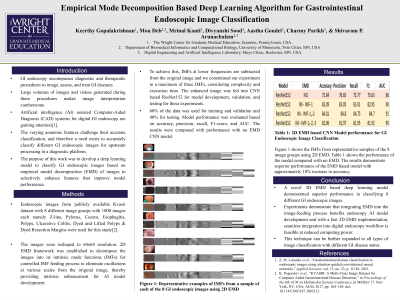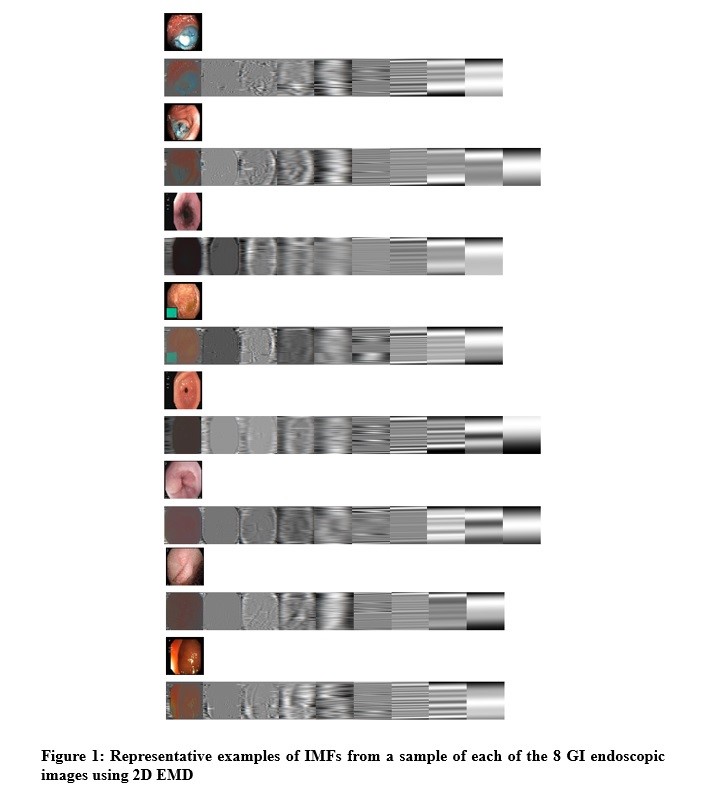Monday Poster Session
Category: General Endoscopy
P2394 - Empirical Mode Decomposition Based Deep Learning Algorithm for Gastrointestinal Endoscopic Image Classification
Monday, October 28, 2024
10:30 AM - 4:00 PM ET
Location: Exhibit Hall E

- KG
Keerthy Gopalakrishnan, MD
The Wright Center for Graduate Medical Education
Scranton, PA
Presenting Author(s)
Keerthy Gopalakrishnan, MD1, Charmy Parikh, MD2, Aastha Goudel, MBBS3, Divyanshi Sood, MBBS4, Shivaram Poigai Arunachalam, PhD5, Mou Deb, PhD5, Mrinal Kanti, PhD6
1The Wright Center for Graduate Medical Education, Scranton, PA; 2Mercy Catholic Medical Center, Darby, PA; 3North Alabama Medical Center, North Alabama, AL; 4University of Colorado Medical School, Denver, CO; 5University of Minnesota, Minneapolis, MN; 6University of Wisconsin, Madison, WI
Introduction: GI endoscopy encompasses diagnostic and therapeutic procedures to image, assess, and treat GI illnesses. Large volumes of images and videos generated during these procedures makes image interpretation cumbersome. Artificial intelligence (AI) assisted Computer-Aided Diagnosis (CAD) systems for digital GI endoscopy are gaining attention. The varying anatomic features challenge their accurate classification, and therefore a need exists to accurately classifying different GI endoscopic images for upstream processing in a diagnostic platform. The purpose of this work was to develop a deep learning model to classify GI endoscopic images based on empirical model decomposition (EMD) of images to selectively enhance features that improves model performance.
Methods: Endoscopic images from publicly available Kvasir dataset with 8 different image groups with 1000 images each namely Z-line, Pylorus, Cecum, Esophagitis, Polyps, Ulcerative Colitis, Dyed and Lifted Polyps & Dyed Resection Margins were used for this study. The images were reshaped to 64x64 resolution. 2D EMD framework was established to decompose the images into its intrinsic mode functions (IMFs) for controlled IMF feeding process to eliminate oscillations at various scales from the original image, thereby providing intrinsic enhancement for AI model development. To achieve this, IMFs at lower frequencies are subtracted from the original image and we constrained our experiment to a maximum of three IMFs, considering complexity and execution time. The enhanced image was fed into CNN based ResNet152 for model development, validation, and testing for these experiments. 60% data was used for training and validation and 40% for testing. Model performance was evaluated based on accuracy, precision, recall, F1-score, and AUC. The results were compared with performance with no EMD CNN model.
Results: Figure 1 shows the IMFs from representative samples of the 8 image groups using 2D EMD. Table 1 shows the performance of the model compared with no EMD. The results demonstrate superior performance of the EMD based model with approximately 10% increase in accuracy.
Discussion: A novel 2D EMD based deep learning model demonstrated superior performance in classifying 8 different GI endoscopic images. Experiments demonstrate that integrating EMD into the image-feeding process benefits endoscopy AI model development and with a fast 2D EMD implementation, seamless integration into digital endoscopy workflow is feasible at reduced computing power.

Note: The table for this abstract can be viewed in the ePoster Gallery section of the ACG 2024 ePoster Site or in The American Journal of Gastroenterology's abstract supplement issue, both of which will be available starting October 27, 2024.
Disclosures:
Keerthy Gopalakrishnan, MD1, Charmy Parikh, MD2, Aastha Goudel, MBBS3, Divyanshi Sood, MBBS4, Shivaram Poigai Arunachalam, PhD5, Mou Deb, PhD5, Mrinal Kanti, PhD6. P2394 - Empirical Mode Decomposition Based Deep Learning Algorithm for Gastrointestinal Endoscopic Image Classification, ACG 2024 Annual Scientific Meeting Abstracts. Philadelphia, PA: American College of Gastroenterology.
1The Wright Center for Graduate Medical Education, Scranton, PA; 2Mercy Catholic Medical Center, Darby, PA; 3North Alabama Medical Center, North Alabama, AL; 4University of Colorado Medical School, Denver, CO; 5University of Minnesota, Minneapolis, MN; 6University of Wisconsin, Madison, WI
Introduction: GI endoscopy encompasses diagnostic and therapeutic procedures to image, assess, and treat GI illnesses. Large volumes of images and videos generated during these procedures makes image interpretation cumbersome. Artificial intelligence (AI) assisted Computer-Aided Diagnosis (CAD) systems for digital GI endoscopy are gaining attention. The varying anatomic features challenge their accurate classification, and therefore a need exists to accurately classifying different GI endoscopic images for upstream processing in a diagnostic platform. The purpose of this work was to develop a deep learning model to classify GI endoscopic images based on empirical model decomposition (EMD) of images to selectively enhance features that improves model performance.
Methods: Endoscopic images from publicly available Kvasir dataset with 8 different image groups with 1000 images each namely Z-line, Pylorus, Cecum, Esophagitis, Polyps, Ulcerative Colitis, Dyed and Lifted Polyps & Dyed Resection Margins were used for this study. The images were reshaped to 64x64 resolution. 2D EMD framework was established to decompose the images into its intrinsic mode functions (IMFs) for controlled IMF feeding process to eliminate oscillations at various scales from the original image, thereby providing intrinsic enhancement for AI model development. To achieve this, IMFs at lower frequencies are subtracted from the original image and we constrained our experiment to a maximum of three IMFs, considering complexity and execution time. The enhanced image was fed into CNN based ResNet152 for model development, validation, and testing for these experiments. 60% data was used for training and validation and 40% for testing. Model performance was evaluated based on accuracy, precision, recall, F1-score, and AUC. The results were compared with performance with no EMD CNN model.
Results: Figure 1 shows the IMFs from representative samples of the 8 image groups using 2D EMD. Table 1 shows the performance of the model compared with no EMD. The results demonstrate superior performance of the EMD based model with approximately 10% increase in accuracy.
Discussion: A novel 2D EMD based deep learning model demonstrated superior performance in classifying 8 different GI endoscopic images. Experiments demonstrate that integrating EMD into the image-feeding process benefits endoscopy AI model development and with a fast 2D EMD implementation, seamless integration into digital endoscopy workflow is feasible at reduced computing power.

Figure: Figure 1: Representative examples of IMFs from a sample of each of the 8 GI endoscopic images using 2D EMD
Note: The table for this abstract can be viewed in the ePoster Gallery section of the ACG 2024 ePoster Site or in The American Journal of Gastroenterology's abstract supplement issue, both of which will be available starting October 27, 2024.
Disclosures:
Keerthy Gopalakrishnan indicated no relevant financial relationships.
Charmy Parikh indicated no relevant financial relationships.
Aastha Goudel indicated no relevant financial relationships.
Divyanshi Sood indicated no relevant financial relationships.
Shivaram Poigai Arunachalam indicated no relevant financial relationships.
Mou Deb indicated no relevant financial relationships.
Mrinal Kanti indicated no relevant financial relationships.
Keerthy Gopalakrishnan, MD1, Charmy Parikh, MD2, Aastha Goudel, MBBS3, Divyanshi Sood, MBBS4, Shivaram Poigai Arunachalam, PhD5, Mou Deb, PhD5, Mrinal Kanti, PhD6. P2394 - Empirical Mode Decomposition Based Deep Learning Algorithm for Gastrointestinal Endoscopic Image Classification, ACG 2024 Annual Scientific Meeting Abstracts. Philadelphia, PA: American College of Gastroenterology.
